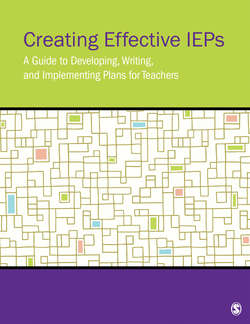Читать книгу Creating Effective IEPs - Nancy Burton - Страница 7
На сайте Литреса книга снята с продажи.
Introduction
ОглавлениеBenjamin Franklin is credited with saying, “If you fail to plan, you are planning to fail.” Whereas there was no such document as an Individualized Education Plan (IEP) during Franklin’s lifetime, his words still hold true when they are applied to the IEP process. Failure to appropriately plan the educational program each individual student with special needs requires is both unethical and negligent.
Effective educators, both special and general educators, understand the need for planning. They know that without an appropriate plan for instruction, there is little assurance that necessary content or skills will be taught. As educators, each of us knows that good planning is essential not only to our success, but also to the success of the students we teach. We also know that when students struggle, our plans must be flexible enough to change so we can appropriately address the needs of our students.
So—what is it about the development of an IEP that causes so much angst among educators? Perhaps it’s because of an especially difficult experience with writing and implementing IEPs . . . or perhaps it’s because of the paperwork . . . or maybe it is the time required of us . . . or it could be . . . well, it could quite possibly be any number of reasons. The answer can only be provided by those individuals who have been involved in the IEP process from prereferral stages through implementation stages. Since the process typically originates in the general education environment, it is safe to say that most general educators have had at least some exposure to or involvement in the development of an IEP. Consequently, it is imperative that all educators have some level of understanding of the IEP process from the prereferral stages through the implementation stages.
Every journey begins with a destination in mind, an ultimate arrival at a much desired place—be it an exotic vacation spot or simply an accomplished goal. But the arrival can never be realized without a carefully prepared plan. In fact, it is the planning of the journey that will determine the final outcome. Travelers recognize the significance of their planning and preparation for their journey. They consider their options; pay close attention to details; are flexible and able to adjust with little warning; and, most importantly, they monitor their progress until the journey’s end.
Preparing an IEP is a journey . . . albeit an educational journey . . . but a journey nonetheless. The IEP is a carefully designed plan to reach a desired destination in the academic and functional lives of individuals who qualify for services under the federal legislation, Individuals with Disabilities Education Act (IDEA) 2004. Although IDEA stipulates the specific components required in every IEP document, the actual plan—the details of the individual journey—is designed and developed for each eligible individual student. The more attention that is given to the details of the plan, the better the student’s chances become for arriving at his or her ultimate destination.
Individualized Education Plans are not generic documents that can—or should—be developed using predetermined or sample goals or objectives. They are intended to be carefully designed plans that reflect what an individual student knows and can do as well as what the student must know and do to progress through the educational system. Every child who qualifies for special education under IDEA 2004 is compelled to take the IEP “journey.” If we, as educators, fail to appropriately plan that journey in collaboration with colleagues, parents and the student, then we not only fail as special educators, but the child has no hope of reaching his or her desired destination.
The intent of the following work is to offer some background and practical guidance for planning and developing effective IEPs—from start to finish. Although each IEP plots an individual journey, the overall concept and requirements are the same for all. So, let our journey begin.
